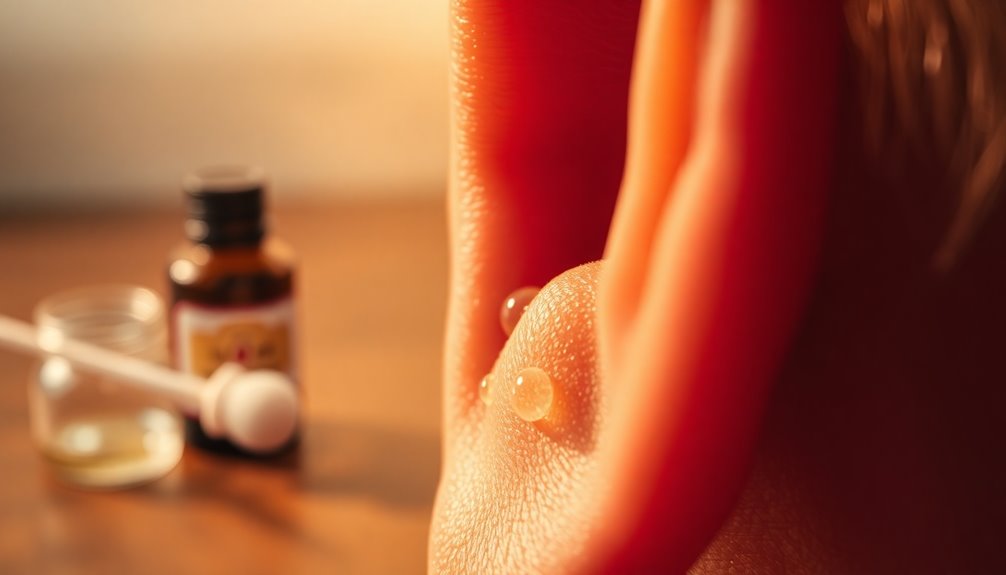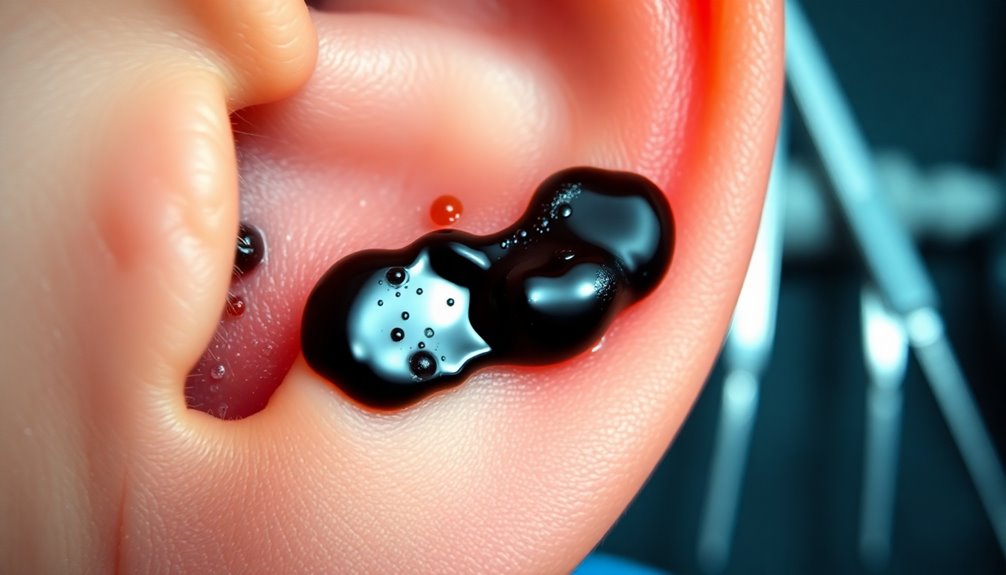If your earwax smells bad, it could indicate more than just a hygiene issue. An excess buildup of earwax traps dead skin cells and bacteria, causing foul odors. Yellow or pus-like earwax suggests an infection that might require medical attention. Environmental factors like smoke or hair products may also contribute to the smell. Don't ignore symptoms like ear pain or discharge; they could point to serious conditions like infections or even cancer. It's essential to pay attention to these signs, as understanding the underlying cause can help you manage your ear health better. There's more you need to know about this!
Key Takeaways
- Bad-smelling earwax often results from excessive buildup that traps dead skin cells and bacteria, leading to unpleasant odors.
- Yellow or pus-like earwax can indicate an ear infection, often accompanied by foul smells and other symptoms.
- Environmental factors like smoke, hair products, and skin conditions such as eczema can contribute to earwax odor.
- Ear infections may lead to additional symptoms like pain, discharge, and temporary hearing loss, necessitating medical attention.
- Ignoring smelly earwax, especially with other concerning symptoms, could signal serious conditions requiring prompt evaluation by a healthcare professional.
Understanding Earwax Composition

Understanding earwax composition is essential for grasping its role in ear health. Earwax, or cerumen, is primarily made up of long-chain fatty acids, cholesterol, alcohols, and squalene. These components work together to create a waxy texture that prevents water, dust, and foreign particles from entering your ear canal. Cholesterol maintains the consistency of the wax, preventing it from becoming too dry or too runny.
Ceruminous, sebaceous, and apocrine glands contribute to earwax's production, creating a protective barrier that lubricates the ear canal. This combination of secretions, along with dead skin cells and hair, forms a unique mixture that serves multiple purposes. The saturated and unsaturated long-chain fatty acids, alongside other chemical compounds like aromatic hydrocarbons and steroids, enhance earwax's effectiveness. Additionally, the presence of natural antimicrobials in alcohols helps inhibit bacterial and fungal growth, contributing to ear health.
Earwax can be classified into two types: wet and dry. Wet earwax is sticky and contains a higher concentration of lipids, while dry earwax is brittle and has lower lipid content. Understanding these differences is crucial, as they can influence not just ear health but also the presence of odors, which we'll explore further.
Common Causes of Odor

While earwax plays a protective role in ear health, certain factors can lead to unpleasant odors. One common culprit is excessive earwax. When it builds up and causes a blockage, it can trap dead skin cells and bacteria, leading to a foul smell. You might also experience earaches, difficulty hearing, or even drainage. Earwax maintains ear health and hygiene and is essential for preventing potential issues related to odor.
Foreign objects, such as beads or small toys, can contribute to smelly earwax as well. They can cause pain and possibly infection, making the odor even worse. Environmental factors like smoke, hair products, and automobile fumes can build up in your ear, amplifying unpleasant smells.
Skin and scalp conditions, such as dandruff or eczema, can also lead to odors. Overactive sweat and sebaceous glands produce secretions that mix with bacteria, creating a foul scent. If you're scratching due to irritation, you might introduce additional bacteria.
Lastly, infections can cause bad odors. Conditions like swimmer's ear or outer ear infections result in discharge that often has a strong smell. Recognizing these common causes can help you address any unpleasant earwax odors effectively.
Impact of Ear Infections

Ear infections can significantly impact your health and quality of life. You might experience pain in your ear, muffled sounds, or even hearing loss. While permanent hearing loss is rare, it can occur in some cases. If you notice ear discharge, itchiness, or swelling, these could be signs of an outer ear infection. Redness and heat around the ear may indicate inflammation that requires attention.
Complications from ear infections can escalate if left untreated. In rare instances, infections can spread to nearby tissues, leading to severe conditions like bacterial meningitis or brain abscesses. You might experience symptoms like severe headaches, stiff neck, high fever, or altered mental status if this happens. Facial paralysis is another potential complication, but most people recover completely. Serious complications such as hearing loss can occur in some children with untreated otitis media.
Acting quickly is crucial. You may require antibiotics or even surgical intervention to prevent long-term damage. If you suspect an ear infection, don't hesitate to consult a healthcare professional. Addressing these issues promptly can help you maintain your hearing and overall health, minimizing the risk of more serious complications down the line.
Effects of Excessive Earwax
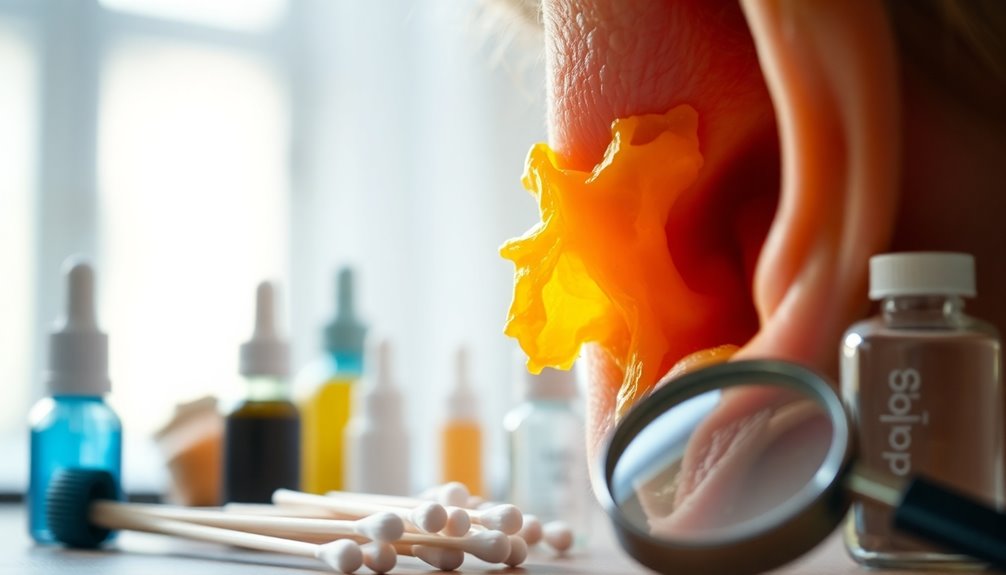
Excessive earwax can lead to a range of uncomfortable symptoms that affect your daily life. You might experience temporary or gradual hearing loss, making it difficult to engage in conversations or enjoy music. Tinnitus, that annoying ringing or buzzing in your ear, could also become a frequent distraction. Additionally, you might feel a sense of fullness or a plugged-up sensation in your ear canal, which can be bothersome.
Pain or earaches may arise from the buildup, and the itching can drive you to distraction. If left untreated, excessive earwax can increase your risk of ear infections, leading to further complications. You may also notice dizziness or headaches, which can impact your overall well-being. In some cases, this buildup might even trigger a reflex cough. Furthermore, regular check-ups can help identify potential problems early and prevent more severe issues.
If you detect an odor coming from your ear, it could indicate an infection or excessive buildup, which is a sign to take action. Regular ear cleaning and avoiding items like cotton swabs can help prevent these issues. If symptoms persist, consider consulting a healthcare provider to address the problem effectively.
Foreign Objects and Smell

A foreign object lodged in your ear can result in discomfort and even an unpleasant smell. Common culprits include beads, small toys, food, insects, and even bits of paper or erasers. When these objects get stuck, they can lead to pain, itching, and a foul-smelling discharge that's often purulent. This smell arises from the body's inflammatory response and potential infection, as the ear tries to expel the foreign body. Additionally, a bacterial growth can occur due to the irritation caused by the foreign object, further intensifying the odor.
You might also experience temporary conductive hearing loss due to the obstruction in your ear canal. It's crucial to avoid using cotton swabs or other objects to dig out the foreign object, as this can push it further in and cause more damage. If you suspect an object is lodged deep, seek professional help from an otolaryngologist, who can safely remove it. They may use tools like alligator forceps for easy-to-grasp items or a curette for smooth, round objects.
Ignoring the issue can lead to serious complications, including damage to your eardrum or ear canal. Don't let discomfort linger—address foreign objects quickly to avoid nasty smells and further complications.
Swimmer's Ear Connection
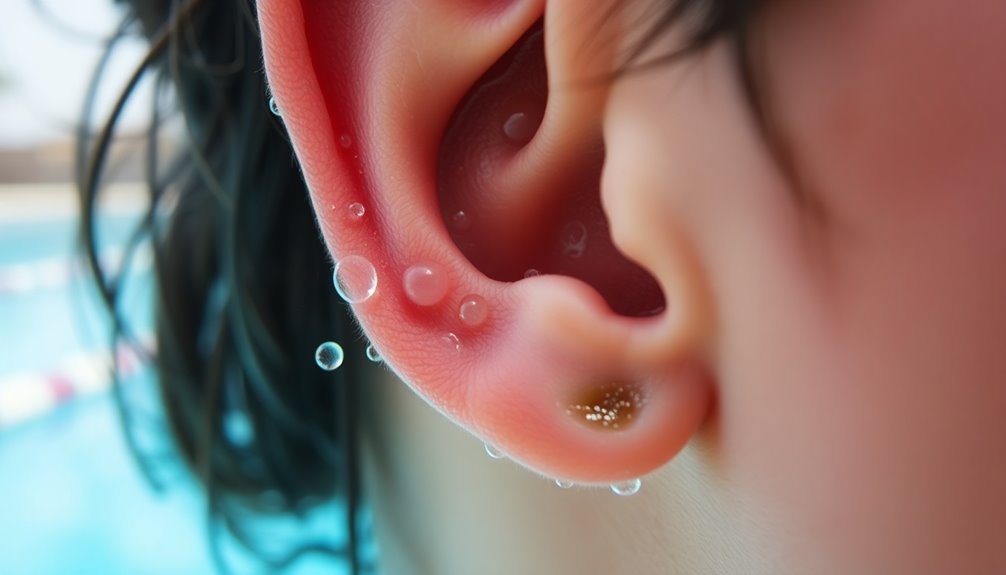
During the summer months, you might find yourself more susceptible to swimmer's ear, a condition that can lead to smelly earwax. When water gets trapped in your ear canal, it creates a moist environment perfect for bacteria to thrive. These bacteria, often found in contaminated water, can cause infections that break down the skin inside your ear, making it easier for germs to invade. Additionally, this condition can be aggravated by chronic skin conditions that affect the outer ear.
As a result, you could experience symptoms like itching, redness, and swelling in your ear. You may notice drainage of fluid that's yellow, yellow-green, or even pus-like, and yes, it often has a foul smell. If you start to feel discomfort that worsens when you pull on your outer ear, it's a sign that an infection might be brewing.
To reduce your risk, avoid swimming in contaminated water and be cautious of excess moisture from humidity or sweating. Steer clear of using cotton swabs or other objects to clean your ear, as they can scratch the skin and create entry points for infection. If symptoms persist, consider consulting a healthcare professional for proper treatment.
Other Concerning Conditions
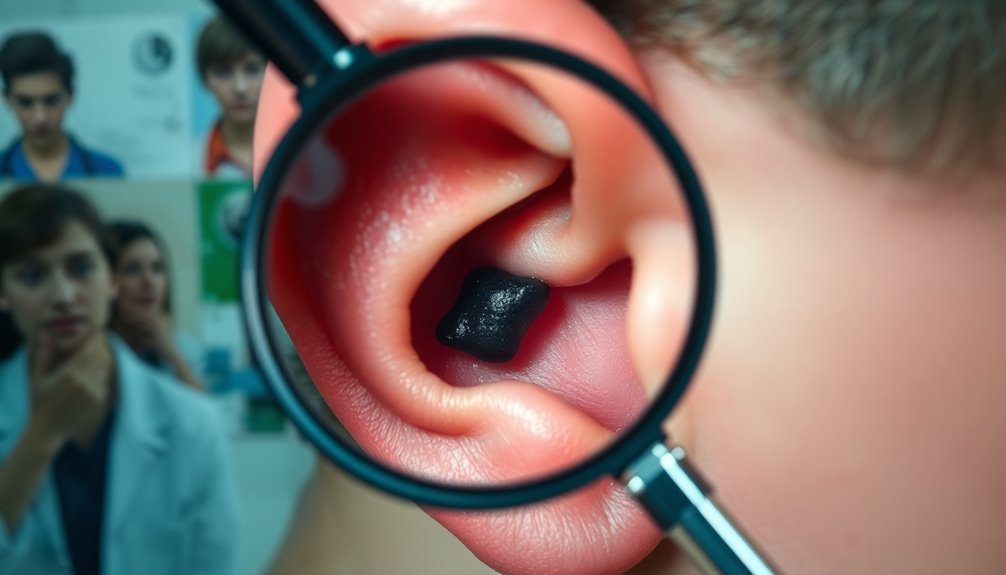
Various conditions can lead to concerning symptoms, including smelly earwax. One common culprit is an ear infection caused by bacteria or fungi, often resulting from excess moisture after swimming or bathing. You might notice itching, redness, and even pus alongside unpleasant odors. If you experience ear pain or fever, seek medical attention quickly for antibiotics or antifungal treatment. Interestingly, earwax contains antimicrobial properties that can help combat bacteria, but when an infection is present, the natural balance can be disrupted. Additionally, mammography aims to detect underlying issues early, similar to how timely intervention can be crucial in treating ear infections. Access to mental health services can also alleviate stress during medical emergencies. It's important to note that cold medications can sometimes exacerbate ear issues by causing sinus congestion.
Another potential issue is cholesteatoma, a noncancerous collection of skin cells deep inside the ear. This can develop after a middle ear infection. Symptoms can include smelly earwax, pressure, and hearing loss. If left untreated, it may lead to more severe complications, and seeking professional counseling can be beneficial for those struggling with the emotional toll of chronic health issues.
Ear cancer, though rare, can also manifest with bad-smelling earwax. Symptoms like ear pain, discharge with blood, and hearing loss should never be ignored.
Lastly, a foreign object lodged in the ear—common in both kids and adults—can cause pain and infection while producing foul-smelling earwax. If you suspect this, get medical help for safe removal. Don't overlook these signs; addressing them promptly can prevent further complications.
Frequently Asked Questions
Can Diet Affect the Smell of My Earwax?
Yes, your diet can definitely affect the smell of your earwax. Consuming spicy foods, caffeine, and alcohol may increase earwax production, potentially leading to odor. Dairy and gluten can also contribute to thicker, stickier wax if you're intolerant. Incorporating omega-3 fatty acids, fruits, and vegetables helps maintain healthier earwax and may reduce unpleasant smells. Staying hydrated is essential too, as it keeps earwax softer and less likely to develop a foul odor.
How Often Should I Clean My Ears?
You should clean your ears based on your individual needs. For many people, a good rule of thumb is every six months, while others might need to go quarterly if they produce excessive wax. If you wear hearing aids, you might want to clean them every three months. Always watch for symptoms like muffled hearing or discomfort, and consult a professional if you notice any issues or if the wax buildup seems excessive.
Is It Safe to Use Ear Candles?
No, it's not safe to use ear candles. They can cause severe burns, perforate your eardrum, and even lead to hearing loss. Plus, they don't effectively remove earwax; in fact, they can push wax deeper into your ear canal. Medical professionals don't recommend them and advise safer alternatives like ear drops or warm water flushing. Protect your ears and avoid the risks associated with this practice. Your hearing is too important!
Can Stress Contribute to Earwax Odor?
Yes, stress can contribute to earwax odor. When you're stressed, your body produces more sweat, which can mix with earwax and lead to an increase in bacteria. These bacteria break down proteins in the sweat, creating unpleasant smells. Additionally, stress can cause your body to produce more earwax overall, resulting in buildup that may harbor dirt and bacteria. To mitigate this, consider stress management techniques and regular ear cleaning.
What Home Remedies Help Reduce Earwax Smell?
To reduce earwax smell, try a few home remedies. You can use olive oil or coconut oil to soften the wax, making it easier to remove. Garlic oil also helps due to its antibacterial properties. For cleaning, mix equal parts alcohol and vinegar and instill it into your ear. Regularly flushing with warm saline or a baking soda solution can further help. Just remember to avoid cotton swabs to prevent pushing wax deeper.
Conclusion
In conclusion, if you notice a bad smell coming from your earwax, it's essential to pay attention. Whether it's due to ear infections, excessive buildup, or even foreign objects, addressing the issue can prevent further complications. Don't ignore the signs; consult a healthcare professional if the odor persists. Taking care of your ear health is crucial, and understanding the underlying causes can help you find the right solutions. Stay proactive to keep your ears healthy and odor-free!
